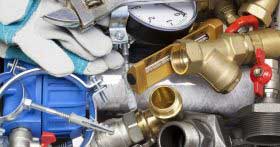 Whether you are considering switching into plumbing as a new career path, or this is the first job-related option you are exploring, there are several steps and milestones needed before you can be titled a plumber. Requirements to be a plumber vary between states (often cities too), but this guide can provide you with useful information for general plumber certifications.
Whether you are considering switching into plumbing as a new career path, or this is the first job-related option you are exploring, there are several steps and milestones needed before you can be titled a plumber. Requirements to be a plumber vary between states (often cities too), but this guide can provide you with useful information for general plumber certifications.
If you find this guide useful and live around Houston, Texas feel free to visit the great staff at Charlie’s Plumbing, Inc. Since 1979, our dedicated company helps relieve any industrial, commercial, and emergency plumbing issue, no matter how large or small. In this post, we will help provide you the information needed to join the industry, and potentially our team, depending on your mastery of the content featured below.
STEP 1: OBTAIN PROPER BACKGROUND EDUCATION
Before an individual can even consider joining a professional field such as plumbing, the proper foundation of education must be laid down. In order to be considered for this trade industry, a high school degree or GED equivalent will be a prerequisite to success. Without this certification educators, employers, and clients will not know if the candidate has proper mastery of a variety of general subjects important for human competence. Math and science are specifically important in the plumbing field to be able to judge water levels, piping dimensions, and accurate measurements.
While studying and obtaining an important education foundation, it is also important to make sure that an individual’s criminal background is kept at an absolute minimum. Any blemishes on driving, criminal, and drug records can impact future apprenticeship and employment opportunities. Do not take this lightly, because increased insurance and safety issues will deter others from utilizing the applicant’s skills, no matter the proficiency or experience. Call Now For Commercial Plumbing
STEP 2: ENROLL INTO PREFERRED PLUMBING PROGRAM
With the proper educational background, the base foundation has been set for you to actually engage in the plumber’s path. Plumbing courses are important stepping stones into the actual field of plumbing. These courses range on topics from piping, valves, drainage systems, venting, and water supply.
These courses can be completed through local community colleges, trade institutions, and even plumbing associations or unions. The curriculum for each of the outlets might alter slightly, so be sure to contact the institution of your choice to learn geographic specific information. The coursework for a typical plumbing program takes around six months to one year to complete, which is often based on individual capability and enrollment size.
STEP 3: FIND AND COMPLETE AN APPRENTICESHIP
For most areas of the United States including the Houston, Texas area, the next step in becoming a certified plumber is to work in an apprenticeship program. An apprenticeship program pairs a pupil (you) with an expert in a given field to learn the trade from the inside. Learning from experts can drastically increase confidence and professionalism, on top of increasing skills to eventually match the initial expert.
In some cases, apprenticeship programs go hand in hand with the technical coursework. If this is the case for you, great! Typically the programs are shorter in duration when paired up, meaning you get into making the real money sooner (note: apprenticeships do come with on-the-job payment, but it is marginal compared to the money of a certified plumber). If they do not offer an apprenticeship program, they likely will have information on completing it elsewhere. This length of apprenticeship can vary depending on factors including some previously listed. Typically the apprenticeship will last two to five years.
STEP 4: GET LICENSED
With successful completion of an apprenticeship, it is time to put these years of hard work to the test! The plumber exam typically comes as a three part exam (one written section & two hands on tests) that is cumulative of the job and classroom experience. Once this exam has been completed, eligibility for positions like gas plumber, service plumber, and journeyman become available. See what types of industries Charlie’s Plumbing services here!
STEP 5: LOOK FOR EMPLOYMENT
With all of the required steps taken you are now ready to become a certified plumber in your local area! Look for job openings, opportunities from previous apprenticeship, or even start your own company (if the pipes line up!)